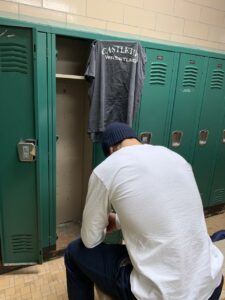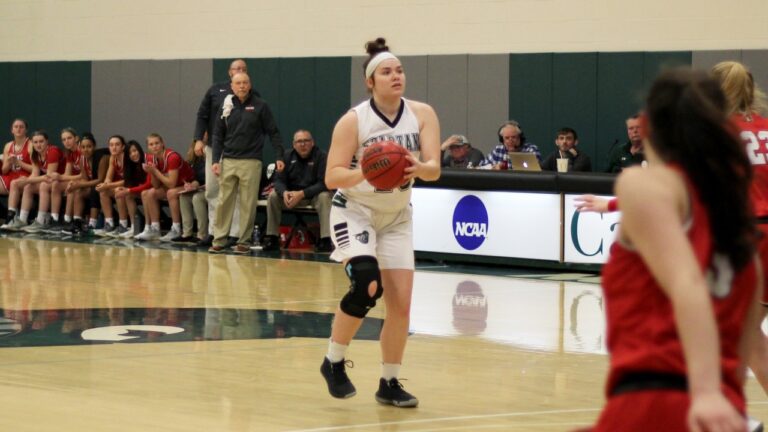Changing the culture

Athlete decompresses in the locker room.
Although younger generations are beginning to talk about mental health more openly, there continues to be a stigma when it comes to student athletes. A Fox Sports article posted on Oct. 8, 2018 by Justin Ching said that, “most student athletes viewed professional help as a ‘sign of weakness.’”
According to a study by the Pew Research Center in late 2018 found that 70% of teenagers between the ages of 13 and 17 consider anxiety and depression a, “major problem,” among their peers.
In 2016 Psychology Today published a study that found that 6.3% of collegiate student athletes met the criteria of clinically significant depression.
According to Drexel and Kean University researchers about 25% of collegiate athletes have reported clinically relevant levels of depressive symptoms.
Men’s soccer head coach John O’Connor said he hasn’t had many players come to him directly, but he said he is vocal about keeping his lines of communication open at all times.
“I’m always talking to them…my door’s open, they have the captains,” he said. “For me personally what I’ll do is I’ll just check in with that kid.”
O’Connor said that if a student athlete came to him and said they needed to talk, he would make the time and speak in his office, or even at his home. He also said that he allows them to call or text them.
Senior football player Austin Crosier said that he has dealt with both anxiety and depression when it comes to his sport.
Crosier suffered a neck and spinal cord injury last year and was unsure if he would ever be able to put the pads on again.
“There would be nights where I would cry myself to sleep because I was so worried about the fact that I might not ever play football again, let alone be able to have full function in my right arm,” he said.
Crosier also touched on the stigma behind mental health with student athletes.
“Many people are afraid or don’t feel comfortable talking to a counselor or psychiatrist because of the age gap,” he said.
Crosier said that he always tells his teammates that he has, “open ears” if they ever need someone to talk to about anything.
While players and coaches like O’Connor are open about mental health issues and letting people know that they are there for them, some student athletes feel that the school can do more to help educate the university’s staff.
Jayna Ryan, a junior softball player, is one of those students. “They come from a different time where mental health was not addressed as openly as it is now. For most of us our coaches and trainers are the adults we trust on campus, but if we feel like we can’t talk to them it only adds to the issue,” she said.
Fellow softball player Miranda Fish agreed that there could be more done by the university.
“I think the school can do more to bring awareness to these issues. Going out and promoting it, as well as providing information to the faculty and the coaches can help to provide a safe environment where people feel comfortable speaking about it,” she said.
Some athletes say there are those who don’t even realize they are dealing with mental health issues until later on in their college careers. A senior wrestler, who asked to remain anonymous, said that it wasn’t until his junior year that he truly noticed what he was facing.
“I think last year was the first time I really took a step back and thought, ‘wow, I may have some anxiety and some depression,’” he said.
The wrestler also touched on how the Wellness Center on campus helped him by not only being there for him but getting him in contact with other local support channels.
“I think that the programs here are definitely helpful, and I don’t see too much of a difference between an athlete and a normal student…Every student obviously has pressures on them,” he said.
Ching included two resources at the end of his Fox Sports article to help struggling student athletes. You can call 1-800-273- 8255 to be connected with a, “skilled, trained counselor at a crisis center in your area, anytime 24/7.” He also included www.ThinkEatPlay.org to find more athlete mental health resources.
Crosier knows that there is a stigma surrounding mental health still today but has hope that things can change in the future.
“I think overall the world is becoming more aware of mental health awareness. Many of my friends here at Castleton show support for each other by being available to talk and vent. If the whole campus did that I’m sure significant change would be made,” he said.







